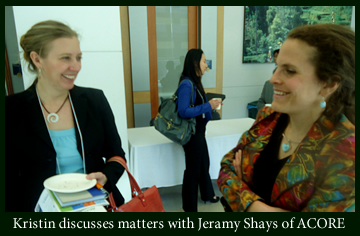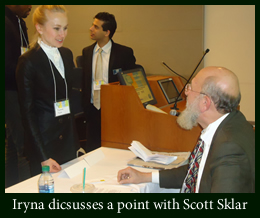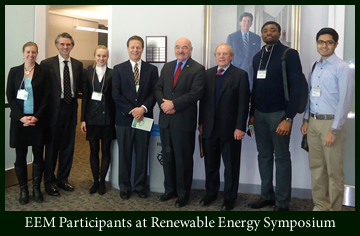On March 22, 2013, a group EEM students and faculty participated in the “Business Response 4.0” Symposium sponsored by the DW School of Business. Members of the EEM family participating in the event included Dr. Kristin Deason, Soala Whyte, Benjamin Heras, Ira Payosova, Anuja Mehta, Cesar Anda and Professor Jonathan Deason.
The event, held in the Elliott School of International Affairs building on GW’s Foggy Bottom campus, featured an array of notable speakers recognized nationally and internationally in the renewable energy field. The keynote address was provided by Vice Admiral Dennis McGinn, President and CEO of the American Council On Renewable Energy (ACORE). Other speakers included Richard Meyer (American Gas Association), Bo Poats (Vice President, Pace Global), Suzanne Hunt (Senior Advisor, Carbon War Room), Christian Gischler (Inter-American Development Bank), Scott Sklar (President, The Stella Group), Josh Green (Managing Director, CCM US), Elliot Roseman (Vice President, ICF International) and Christopher Shybut (U. S. Department of Energy).
In light of the fact that global demand for energy will continue to increase in both the short and long term, the speakers provided a candid discussion on how to meet the expanding global demand for energy, and offered him a vision for providing accessible energy to meet the challenges of tomorrow.

Topics of discussion included how to create a domestic sustainable framework to secure a reliable energy matrix for the future in the United States, and how to connect local and global interests to achieve socially economically and environmentally sustainable energy systems worldwide. Panelists discussed challenges and perspectives on clean energy finance and project development, including a focus on the importance of innovative technology, project finance and policies to promote clean energy projects.
Discussions included opportunities and challenges that exist in the current energy matrix in the U.S., and topics concerning energy generation from conventional and non conventional sources of energy, including the political, environmental, technological and economic framework surrounding current energy market.
A sustainability panel explored the implications of sustainable energy systems in both local and global scales and how to bridge them together, and discussed the social, economical and environmental benefits and inherent challenges of implementing such systems. A global energy outlook panel focused on achieving universal energy access as a key development goal that can power opportunity and pave a path out of poverty. The global panel provided an international perspective on the opportunities and challenges in securing sustainable source of energy.

Organizations also represented at the symposium included the National Hydropower Association, EnviRelation, ICF International, PEPCO, PACE Global, OPower, Eco-Coach the Bureau of Ocean Energy Management, the Nuclear Regulatory Commission, and the Federal Energy Regulatory Commission.


